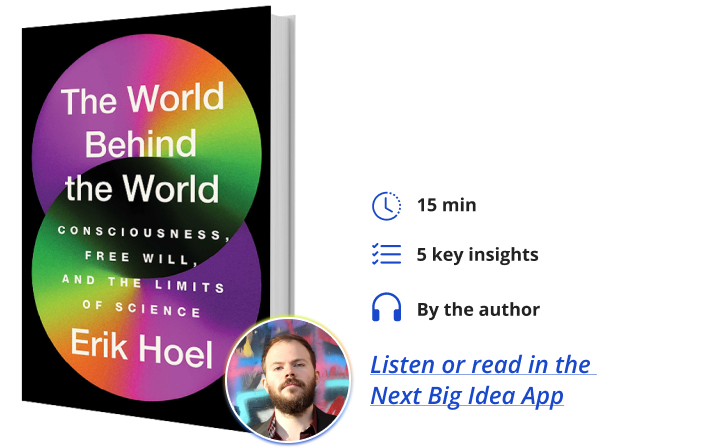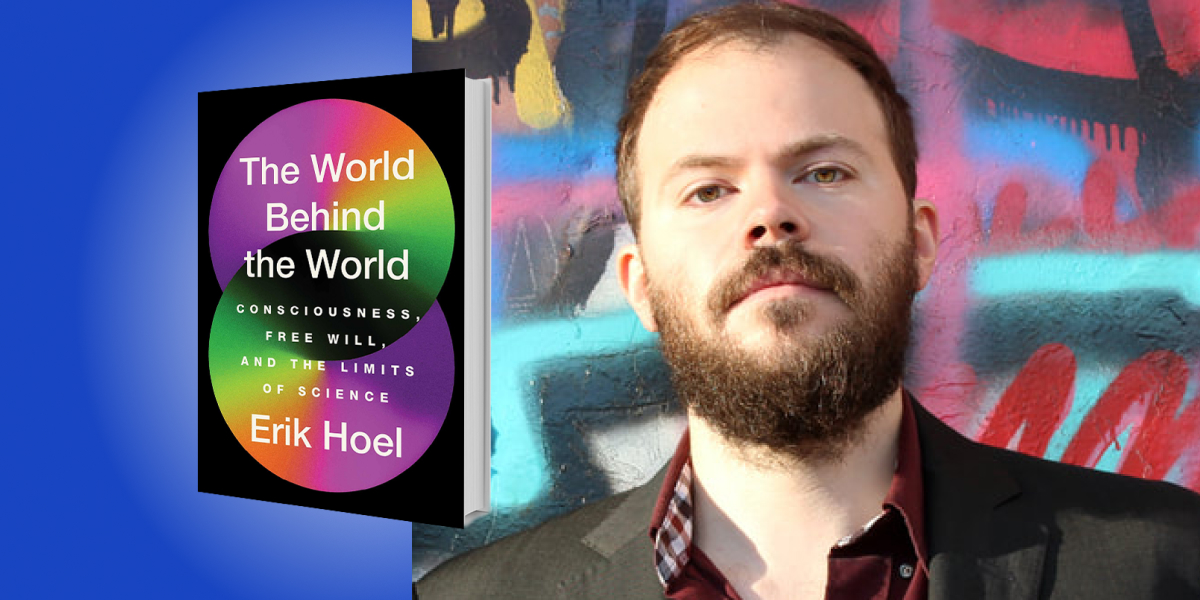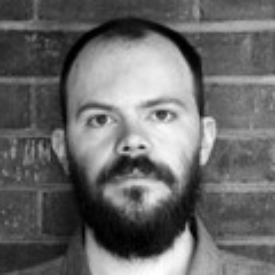Dr. Erik Hoel is one of the Forbes 30 Under 30 in science and also a New York City Emerging Writers Fellow. His writing has appeared in The Atlantic, The Baffler, and The Daily Beast, among many others. Erik received his Ph.D. in neuroscience at the University of Wisconsin-Madison, was a postdoctoral researcher at Columbia University, has held a visiting scholarship at the Institute for Advanced Study at Princeton, and is now a research professor at Tufts University where he studies consciousness and emergence.
Below, Erik shares five key insights from his new book, The World Behind the World: Consciousness, Free Will, and the Limits of Science. Listen to the audio version—read by Erik himself—in the Next Big Idea App.

1. There are two fundamental perspectives on the world.
The first is the extrinsic—this is the explanation of the world that’s about mechanism, about what causes what. An engineering diagram is extrinsic.
There’s also the intrinsic perspective on the world. Thoughts, feelings, contemplations, emotions—these are all intrinsic phenomena. The intrinsic perspective is about consciousness, or what it is like to be you.
Depending on what we want to explain, we shift fluidly between giving an extrinsic account or an intrinsic account. Sometimes, we may even accidentally use one for the other when we shouldn’t. A car breaks down and we say, “Talk to me, tell me what’s wrong, tell me what’s wrong?” But generally, such mixing is a mistake. It’s as if we have two extremely different lenses that we use to understand everyday things.
Scientists, however, do try to reconcile the two perspectives—an effort called the search for a scientific theory of consciousness. The goal is to explain what the brain does, specifically, that allows it to have all the intrinsic qualities we have, like experiencing how ice cream tastes, or how music sounds. Not just processing the information, which can be given some extrinsic account like “neuron A fired, and then neuron B fired,” but transforming that information into consciousness.
The intrinsic is often the topic of the humanities, from literature to art. In a way then, neuroscience is the bridge between the humanities and the sciences. It is only in the brain that the two perspectives are somehow, perfectly, fluidly, every day, at every waking moment, fully reconciled. It’s like we’re missing certain laws of nature—the law that governs how a certain neural firing is accompanied by, or transformed into, a certain experience. Which means there is a big hole in the middle of the world.
2. The intrinsic perspective didn’t start out fully developed (and neither did the extrinsic).
Julian Jaynes discussed this in his cult classic book, The Origin of Consciousness in the Breakdown of the Bicameral Mind. His hypothesis is that consciousness arose from the integration of the two hemispheres around the Homeric age.
It’s a wild hypothesis, and the only evidence is a careful textual analysis. While I think the support for consciousness arising in the Homeric era is very low, there is another hypothesis: that our descriptions of minds have grown increasingly deep and complex over time, just as our descriptions of the extrinsic universe has. One could go over the evidence for this forever, but it’s most salient to take a single example: essentially the same story told over and over throughout the ages.
“Our descriptions of minds have grown increasingly deep and complex over time.”
We can use “The Story of the Shipwrecked Sailor,” a tale from Ancient Egypt. It’s about a shipwreck on an island that contains a monstrous snake. Here’s from a translation:
I uncovered my face and found that it was a snake that was coming. It was thirty cubits long… He opened his mouth to me while I was on my belly in his presence. He said to me, “Who brought you? Who brought you, commoner, who brought you to this island in the sea whose sides are in the water?”
“The Story of the Shipwrecked Sailor” basically gets retold throughout the millennia, so many aspects of it in later tales, like the run-in with a monster, the strange island, crop up in The Odyssey. Odysseus and his men famously wander into the cave of a dangerous cyclops. But in the Odyssey, at least some of their intrinsic perspective is actually noted and told.
But when he had busily performed his tasks, then he rekindled the fire, and caught sight of us, and asked: “Strangers, who are ye? Whence do ye sail over the watery ways?” … So he spoke, and in our breasts our spirit was broken for terror of his deep voice and monstrous self; yet even so I made answer and spoke to him.
Let’s look at the same encounter between a man and a beast, this time in Ulysses by James Joyce. Ulysses is, of course, a heavily modernized retelling of The Odyssey. What follows is sometimes called the “cyclops” part of Ulysses, with a pub being like the cave, and it’s also guarded by a “monster”—except it’s a dog—and owned by the “cyclops”—except it’s just a huge guy with an eyepatch.
. . . and there sure enough was the citizen [“cyclops”] up in the corner having a great confab with himself and that bloody mangy mongrel, Garryowen, and he waiting for what the sky would drop in the way of drink.
There he is, says I . . .
The bloody mongrel let a grouse out of him would give you the creeps. Be a corporal work of mercy if someone would take the life of that bloody dog. I’m told for a fact he ate a good part of the breeches off a constabulary man in Santry that came round one time with a blue paper about a licence.
That’s the development of the intrinsic perspective, from what is a flat and unemotional reaction to a legitimate monster to describing every speck of thought in reaction to a common dog.
3. Reconciling the two perspectives requires a science of consciousness.
In the modern age, the two perspectives on the world are highly developed. We can talk about minds with ease, we can talk about atoms with ease. But the perspectives are extremely different. So how do we reconcile them?
That’s the job of what’s called the search for a scientific theory of consciousness. It was originally pioneered by two titans of science: Francis Crick and Gerald Edelman, both of whom won the Nobel Prize (for different reasons). They both fixated on consciousness as one of the last big unanswered questions in science: How does the brain generate experiences? Sensations? Thoughts? While this may seem the obvious goal of neuroscience, for a long time consciousness was verboten in science. It was worried that if the intrinsic perspective was allowed in, this might shatter the extrinsic one that science is based on.
“There is no well-supported theory of consciousness.”
However, the good thing about winning a Nobel Prize is you can do whatever you want. So both men did, and through their efforts, they established the subfield of neuroscience that studies consciousness.
Their approaches were different. Francis Crick, co-discoverer of the structure of DNA, took a more conservative approach and began the search for what he called the “neural correlates of consciousness.” The idea was to examine the brain and look for correlations between neural activity and experiences, and that a theory would follow empirical work. Comparatively, Edelman wanted a big theoretical leap forward, and then to support them with empirical work.
Two houses of research, if you will, one for Crick, the other for Edelman. While both have shown promise, ultimately as it stands, there is no final conclusion. There is no well-supported theory of consciousness. But thanks to them we have some guesses, some theories, and a growing scientific field.
4. What if a theory of consciousness is impossible?
What if we can’t actually reconcile the two perspectives to our satisfaction? That’s a legitimate but rarely considered possibility. What this would mean is that a theory of consciousness cannot be had, or at least, aspects of consciousness cannot be explained by science. This would be quite surprising, given all the success that science has had in explaining the world. Phenomenon after phenomenon has been explained by science, but those were all extrinsic phenomena, not intrinsic ones. We have reason to believe this time it might be different.
After all, there is an analogous situation in mathematics. Originally it was thought that mathematics, the purest of thought, could be set on epistemically unassailable grounds. But Kurt Gödel’s proofs showed that formal systems, like sets of axioms, were necessarily incomplete, and could not prove their own consistency. It’s not that mathematics is impossible, or a lie, it’s that it is fundamentally closed in certain abstract ways. The big problem was self-reference. An easy way to understand this is what is called the “Liar’s Paradox,” wherein someone declares “I am lying right now.” The sentence itself is the subject, and this recursion triggers a paradox: either they are lying, in which case they are telling the truth, or they are telling the truth, in which case they are lying.
But if self-reference leads to paradox in mathematics, might it not do the same in science? Might science be necessarily, fundamentally, incomplete? Of course, science isn’t normally thought of as a formal system. But we can imagine it to be, for a moment, and think about what is happening when science is pointed back at the scientists themselves. It’s a case of recursion. Perhaps it too triggers a paradox.
There is actually some evidence of other undecidable properties in nature—there are various proofs in fields like physics that some properties or answers are beyond science, but usually this has been proven for edge cases that don’t seem to matter too much to working scientists. But what if consciousness itself is like that? That would perfectly explain why consciousness is so difficult to explain in scientific terms, since by embedding the intrinsic in the extrinsic we trigger the same sort of abstract recursion that Gödel’s proofs relied upon, and we end in paradox.
I call this “scientific incompleteness.” While I can’t prove it’s the case, there is enough suggestive evidence there to worry it’s true, and that may mean not only that we might never possess a scientific theory of consciousness, but that we might never fully understand the universe at large. We might be living in a paradox.
5. The scientific worldview doesn’t necessarily entail that you don’t have free will.
This is important because such arguments actually affect people’s behavior. Studies have shown that a belief in free will is associated with healthy psychological profiles, like being unlikely to be depressed, and so on. Usually, free will denial is given a form of something like this: “Since you are made of physical atoms, and your atoms are following the laws of physics, and they are the ones that cause everything you do, you yourself don’t cause anything.” Another example might be: “Since it is possible to predict the future state of the universe from the current state, your actions are predetermined.” Often this is framed as the scientific worldview itself ensuring that this is true.
However, these sorts of arguments have not reckoned with some major scientific changes in our understanding of the world, just in the last few decades. Combined, these major changes in our understanding do give us something that arguably looks a lot like a scientific argument for free will.
“Studies have shown that a belief in free will is associated with healthy psychological profiles.”
First, there has been the development of what’s called computational irreducibility. The conclusion of this field of complex system analysis can be summed up as: “While a given system might be following predetermined rules, it may be completely impossible, even in principle, to predict what the system will do unless you watch what it does.” This is why, along with chaos theory, which is related, no matter how fine-grained our measurements of the weather become, we can never actually predict the weather. We just have to wait and see what happens. But it seems quite likely the brain satisfies these sorts of properties as well, and it would be impossible to predict ahead of time. You simply have to wait and see. While perhaps some perfect model could be used for prediction, this doesn’t eliminate the unpredictability of that new model itself. That is, the science of complex systems means that the argument—you don’t have free will because it is theoretically possible to predict your actions—has a definition of “prediction” that is arguably bled dry entirely, and is toothless.
The second major change is even less well-known, which is an improved grasp of causation and causal modeling. This has led to a better understanding of what does what. But it’s also shown a counterintuitive effect. Under the right conditions, “causal emergence” can occur, where the higher levels of a physical system can have irreducible causal power, not just the lower ones. It renders untrue statements like “You didn’t move your arm, your atoms did it.” Because actually your atoms don’t appropriately account for the causation. Causal emergence comes when the higher levels of description of a system, like a psychological description of a brain, add error correction into the causal relationships of the parts of the system or its effects. It was discovered by a team of researchers, including myself in graduate school.
These two changes mean that a lot of the more common and powerful arguments that the scientific worldview rules out free will are untrue. Especially as it’s highly possible that the brain itself satisfies these conditions, and has these properties: that is, it is both fundamentally unpredictable and causally emergent. Either way, until that’s figured out, we should hold off declaring free will deceased.
To listen to the audio version read by author Erik Hoel, download the Next Big Idea App today:































